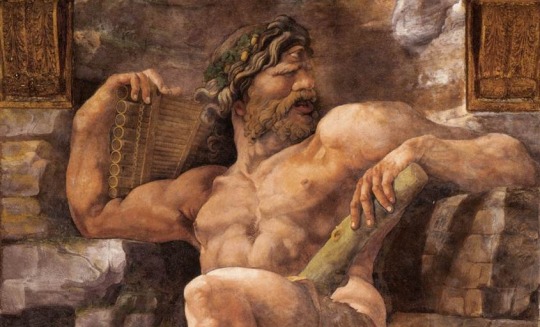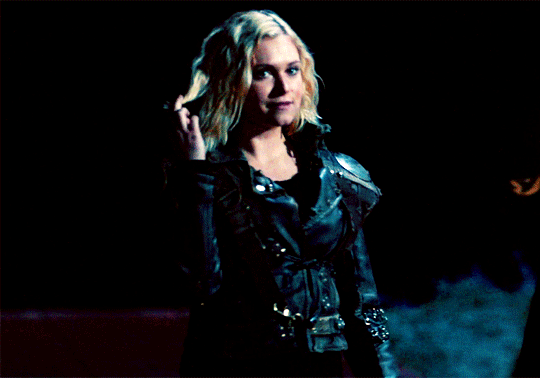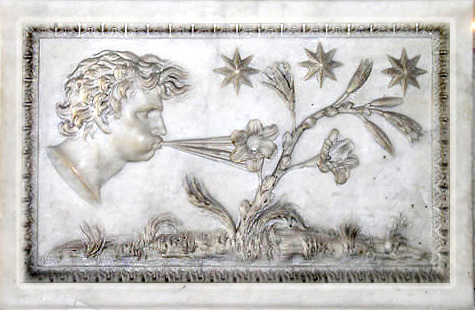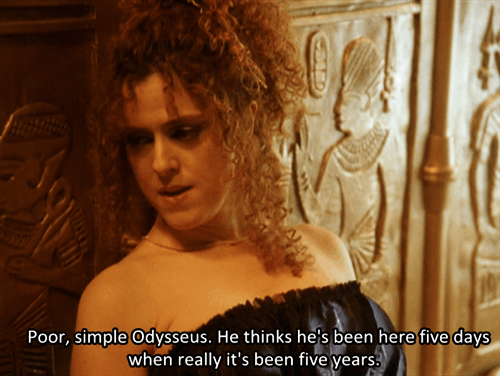#i’ve never really read the iliad bc i don’t read lmao
Text
Ὀδύσσεια + τό ἑκᾰτόν
OR The Odyssey + The 100, an in-depth look at parallels to Homeric canon in season 6, and how the themes and motifs present on Sanctum mirror Odysseus’s 10-year journey back to Ithaca.
DISCLAIMER: I was a Russian Lit major, not a Classics major, so I’m not an expert on this. I did study Ancient Greek and Ancient Greek Drama for 6 and 2 semesters in college, respectively, though, but my expertise is more on The Iliad than The Odyssey so just...cut me some slack lol
If you’re not down for this 2.7k word mini-dissertation, here’s your chance to turn back.
So for those of you who don’t know me, I’m a major Classics nerd. I studied The Iliad in the original in college (and yes, I will be writing a series of metas about how s1-5 are The Iliad so keep an eye out for that), but The Odyssey remains, arguably, Homer’s most prolific epic. I’ve never parsed the text in the original, so I’m not going to be doing any sort of text-to-quote analysis because I think using a translation would be a disservice to the text (major Classics nerd. cannot stress this enough.), but I’m gonna be doing a rundown of all the major stops on Odysseus’s journey and how The 100 has mimicked each and every one of those stops in season 6 thus far.
Still reading? Cool, let’s do this thing.
Some of you may have already read my theory on the anomaly and how I think what lies inside is something like the Island of the Lotus Eaters. If you haven’t read it, you can check it out here, but brief summary: the Lotus Eaters is the first stop Odysseus and his crew make. The Lotus plant is so entrancing that it makes people forget all about their lives outside the island and coerces them to stay there, stuck in a sort of opiate-like blissed out haze of chillness for the rest of their lives, and I think that may be what’s happening in the anomaly, not time travel like others have theorized. Cool, moving on.
The next stop of Odysseus’s journey is the island of Polyphemus, the cyclops who intends to eat him and his men.

(Giulio Romano, Polyphemus)
They manage to escape when Odysseus (using the fake name of “Nobody”) blinds Polyphemus and they hide under the bellies of his sheep in order to avoid detection as they escape his cave.
Let’s think, how does this relate to our heroes? What’s happening right now on the show, going into episode 6x12?

(gif credit: @commander-anya)
Clarke is pretending to be Josephine in order to blindside the Primes and help her people escape.
In The Odyssey, this is a continuation of the theme of “hosting” or “guest-friendship” (a term I’m borrowing from wikipedia since I’ve been out of school for over a year and don’t feel like actually thinking for this pseudo literary analysis). We saw this with the Lotus-Eaters, and we see it again with Polyphemus. But the Cyclops is a bad host. So are the Primes.
Polyphemus’s host gift to Odysseus is that he tells him he’ll eat him last. He won’t spare him, but he’ll give him longer to live than the rest of his men. One of the drawbacks, is that means Odysseus is going to watch all of his people die, one by one, until he meets his demise.
God, how many times have Clarke and Bellamy watched their people suffer? And now the Primes have a way to make nightblood. They’ve turned Echo into a nightblood. Who’s next? Presumably all of them, one by one, until all the Primes are brought back to life. And with Clarke masquerading as Josephine, how many of her people is she going to watch be tortured? How many might she lose in tonight’s episode and in next week’s episode before they manage to beat the Primes and escape? How much have they lost? How much more must they lose?
We also get our first hint of the theme of “cunning over strength” (a term I’m borrowing from SparkNotes because, again, I really don’t feel like putting more effort into this than I already am lmfao) at this point in The Odyssey. Odysseus devises a plan to escape the Cyclops that involves very little violence compared to the blood-soaked battles that we saw in The Iliad. Rather than brute force, he uses his cunning to escape.
Clarke is going in as Josephine. She's not going for brute force. She’s not barging in with an army (that part comes later). This move is pure Clarke, all head. Going with the most cunning plan, not the most direct, not the most violent, the most strategic.
Clarke Griffin is Odysseus.
GODDAMN IM LOVING THIS. I digress.
The next major plot point in The Odyssey is Odysseus running into Aeolus, the god of the winds.

(source unknown by me, but this image is public domain)
He gives Odysseus a bag containing the four cardinal winds which, when opened at the right time, will send him straight home to Ithaca. His men think that the bag secretly contains a treasure that Odysseus is hoarding for himself and they open the bag, releasing the winds, and sending their ship even further off course than before, prolonging their journey.
I stumbled over this one for a second because it could be a few different moments in season 6. Gabriel giving Clarke info on how to take down the Primes? No, where’s the sabotage there? Murphy attempting to help Josephine to get mind drives for him and Emori? No, he ends up doing the right thing and puts them on the right track. Spacekru & friends devising a plan to defeat the Primes and Madi attacking them, sending them off the proverbial course? Hmm, sounds about right.
To make this easier for me, let’s call Bellamy, Echo, Emori, Murphy, Jordan, Miller, and Madi Spacekru 2.0. Well, they’re trying to make their plan to “work with” the Primes so they can get a compound, a home, for them and their people. But Madi is the crew to Spacekru 2.0′s Odysseus. She has her own agenda. She wants the treasure, she wants her revenge.
She attacks the Primes, releases the winds as it were, and all hell breaks loose.

(gif credit: @bellamyblakepositivity)
They’re thrown off course. How will they ever get their compound now? How will they get their home?
[Fun etymology fact break: Homecoming is stylized in The Odyssey as “νόστος” (nostos), when an epic hero returns home via voyage by sea, aka the MAIN theme in this epic. We get the word “nostalgia” from nostos, mixed with άλγος (algos) which means pain. Nostalgia is the pain of yearning for the past or for home. Is nostalgia/homecoming not one of the key themes of The 100? Is it not one of the key themes of The Odyssey? (also you could probably write an analysis of how nostos is a hero returning by sea and the way that space and the sea are often visually/metaphorically compared, the way you navigate both domains in a ship, the way you have an odyssey and a space odyssey....but that’s a discussion for another time)]
Next up on the journey? Aeaea, Circe’s island.

(gif credit: ? if anyone knows, hmu so i can give credit please!)
Circe was a witch who turned men into animals (mainly pigs in The Odyssey, but in another myth, into a woodpecker, which isn’t relevant, I just think it’s funny). Here we get the motif of transformation and false appearances, a continuation of the Nobody plot, and a motif that we also see with the Primes taking over other people’s bodies, constantly transforming their appearances.
While climbing a mountain to reach Circe’s palace, Hermes points Odysseus to a plant which will make him immune to Circe’s transformation magic. Why does this sound familiar......
The neural mesh in Clarke’s head gives her resistance to the mind drive allowing her consciousness to survive the “transformation.”
Like the Island of the Lotus Eaters (and the anomaly) Circe has the ability to manipulate the passage of time, or rather, the perception of the passage of time. Odysseus loses quite a significant amount of time trapped on her island. (It’s not actually 5 years, the mini-series fudged that bit a little since Homer never specifies how long it is, but I’ll forgive you, The Odyssey mini-series, because I love you so very much that I cried when I found you on DVD in a tiny Wal-Mart in the backwoods of Tallahassee two years ago)
We also get another look at the complicated theme of guest-friendship on Circe’s island. She is, quite simply, a terrible host. She traps Odysseus’s men, just like the Primes trap Spacekru 2.0. Odysseus frees them. It’s on Clarke to free her people from the terrible hosts that are the Primes. There’s a joke in there about the Primes bodies being hosts to the mind-drives. Anyway.
Odysseus’s next stop is the land of the dead. He descends into Hades (a very perilous feat) to talk with the blind prophet Tiresias. He also talks to Anticlea, his deceased mother.
My god, if that stop isn’t exactly 6x07 Nevermind.
Clarke talks to Jake Griffin, and tells him she thinks she’s dead, she’s ready to give up, she’s ready to let go. Odysseus tells Anticlea he feels the gods are against him, his journey is fruitless, he’ll never make it home. I don’t think that parallel could be more obvious if it punched you in the face.
I think maybe Monty is Tiresias in this scenario, giving Clarke advice and helping her navigate the mindspace so she can send a message to Bellamy that she’s alive which will give her the advantage of having an ally on her side. Odysseus promises Tiresias he’ll make a sacrifice to him once he gets back into the world of the living bc the dead feast on blood or something like that, but that’s like Clarke promising Monty she’ll do her best to continue to honor his challenge to her to do better. So cool. Love it.

(gif credit: @janemichaels)
Thematically, this mimics the theme of “testing” that’s present in The Odyssey (thank wikipedia again for helping me on this one lmao). You get Odysseus’s men’s loyalty being tested, and you get Odysseus’s identity itself being tested.
Clarke is tested when she is faced with the option of giving up and letting go. Spacekru 2.0 (and particularly Murphy and Emori) are tested when they learn Clarke is gone, then learn she’s alive. Will they be loyal enough to her to save her? Hint: yes, obviously, because Spacekru 2.0 is way better than Odysseus’s crew. Will Clarke decide to push forward and fight for her life? Hint: yeah, duh, because she’s just as badass as Odysseus.
Next comes the sirens.
Odysseus’s ship sails through the isle of the sirens, whose song lures sailors to their deaths. Odysseus makes his men stuff their ears with beeswax so they won’t be tempted by the song, but he ties himself to the mast, wanting to hear it. I kinda struggled with this one, but then I realized, at this point, we’re not looking at Clarke as Odysseus.
We’re looking at Octavia as Odysseus.
Octavia is faced with her greatest fear. She ends up running into the anomaly after Diyoza. If I’m right about the anomaly being sort of the Lotus Eaters, then we could assume that the anomaly holds Octavia’s deepest desires; that might have been what she’d have seen if she’d chosen the green box. She hears the call, and resists. The temptation and the overcoming thereof.
I think that’s clear enough, so I’m gonna skip ahead to the passage between Scylla and Charybdis.
Earlier, Circe had warned Odysseus of this choice he would have to make. Choose the 6-headed monster on the left and lose at best, 6 of his men. Choose the whirlpool on the right, and lose them all.
[Sidenote: how interesting is it that the anomaly is associated with a spiral shape, mimicking that of a whirlpool? Should we believe that if they enter the anomaly it is, in fact, certain death that awaits them? Or is it a metaphoric whirlpool, and they’re just being sucked in, never to return to their original mission of returning home (*cough* Lotus Eaters again *cough*)?]

(gif credit: @aryastarktheshewolf)
So I think this choice is reminiscent of Octavia’s choices of the red box versus the green box. Presumably, face her greatest fears or her deepest desires. She chooses the red box. Better to face her fears and risk dying that way than face her desires (the same green of the anomaly anyone??) and risk getting sucked in like Diyoza was, never to return.
She never saw her deepest desires in the forest (from what we saw) so it makes sense that she would choose the red box. She knows she can escape her fears. Blodreina no more. But if she faces her desires, who’s to say she could ever turn back?

(gif credit: @daeneryskairipa)
Cool cool, so freaking cool, I love these parallels so much, y’all.
Now we get to explore the most Prime-like example of “guest-friendship” in The Odyssey.
Ogygia. Calypso’s island.
[Fun etymology fact break: “Kαλύπτω” (kalupto), the word that lends its root to Calypso’s name, means “to conceal” or “to deceive.” Calypso is “the one who conceals,” she’s “the deceiver.” “Ὠγύγιος” (ogugios), which lends its meaning to Ogygia, means “primeval” or “primal.” The Primes...the first settlers of Sanctum...the ones from the earliest ages (another interpretation of the word). The Primes, the deceivers. The Primes, the primeval ones. Hmmm.]

(screencap from The Odyssey mini-series, 1997. btw, Vanessa Williams will ALWAYS be Calypso in my mind)
Calypso offers Odysseus a home on Ogygia, but he will have to abandon his dream of returning to Ithaca, to his home, to his wife, Penelope, and to his son, Telemachus. She actually prevents him from leaving for seven years (more warped passage of time a la the anomaly), effectively keeping him prisoner. But he wants for nothing there. He is fed and clothed and bathed and sheltered.
Our heroes are offered a home on Sanctum, but it’s not all it appears. It’s not the paradise they’re lead to believe it to be. They’re deceived.
[EDIT: Leah @braveprincess offered an interesting take on Calypso, which I absolutely HAVE to share with y’all:

Anyway, let my rant continue]
In order to stay, they must sacrifice Clarke, Madi too, and well, now, all of their people the Primes want to make into nightbloods. They’re prisoners in Sanctum. They can’t leave, not only because the Primes won’t let them, but because what awaits them is the Children of Gabriel and the mysteries of this new planet. Their best chance at survival is with the Primes. But that also means compromising and losing people they refuse to be without.
Bellamy is Odysseus now. Clarke is his Penelope.

(gif credit: @bellarkedaily)
He won’t negotiate with the Primes. He won’t sacrifice Clarke. Shut up, I’m not crying, you’re crying.
Athena asks Zeus to intervene, so he sends Hermes to tell Calypso she must release Odysseus. Odysseus leaves to continue the next, and last, part of his journey. His return home.
Bellamy leaves Sanctum to save Clarke. Once he has her back, they can continue their final journey, building a home on this new world. Or so we hope.
But who knows? We haven’t seen the finale yet. Maybe they’ll stay on this world. Maybe not.
Some people have been theorizing that they’ll return to Earth (via time travel or whatever it is, which I don’t really buy but whatever), which would be a really nice conclusion to the theme of nostos, but the problem with that is right now, there is no Earth to return to. Nostos only works if there’s a home to go back to. And that home, usually, must be unchanged from when the hero left to fit into the proper meaning of the word.
So, what would be the best way for The 100 to get our heroes back to Earth to fulfill this Odyssey-esque narrative that they (probably unwittingly) have set up?
SEND ‘EM INTO THE ANOMALY!
Let them chill there, enjoy a little bit of paradise, let time pass super fast in the outside world while it passes normally for them, let Earth recover, and send ‘em back. But that bit is more of a pipe dream than anything else and I doubt that’s what they’ll do. I’m not a big fan of most anomaly theories, but I think that could be a cool one. Who knows.
Anyway, that’s all I have for today. Next week post-finale, I’ll probably work through the rest of The Odyssey, with Odysseus’s return to Ithaca, defeating the suitors, and winning his wife back, if all goes to plan with beating the Primes. So if you liked this (admittedly rambling half-cocked mini thesis paper), keep an eye out for that one.
After this season, I’m gonna be doing a series on how seasons 1-5 are actually The Iliad, so if you wanna scream about Classics & The 100 with me, just drop a line in my ask :)
#the 100 meta#meta#the 100#the100meta#the 100 spoilers#the 100 is homer and you cant convince me otherwise#my transliterated greek is ancient greek pronunciation not modern greek#so dont @ me about that lmao ik upsilons are different in modern#i hope u enjoyed and uhhhh come yell with me about classics
70 notes
·
View notes
Note
I read a theory once that Priam specifically did keep Helen there (vague on her feelings about it), as retaliation against the Achaeans because Herakles and his buddies murdered Priam’s family and gave his sister Hesione to Telamon, and Priam never saw her again. It seemed like a pretty good motive tbh, but not consistent with the Priam presented in the Iliad... any thoughts? /odiko
I’ve heard that too but it’s not, afair, indicated anywhere in the Iliad, and like you said doesn’t even really line up with his Iliad characterization… w/ my post I was only talking specifically about Iliad/Odyssey facts, although I guess the Helen/Menelaus marriage myth proceeded or followed it… But that doesn’t contradict what we see in the Iliad tho so it made more sense to me to include than something like this which is a lot more difficult to make agree with the other facts. If we got into how these characters are portrayed by other authors (if that detail happened to originate from another) I don’t think we could ever make all the different versions agree LMAO like Euripides’ Menelaus is at times so wholly different from Homer’s, I’ve never tried to really tie into my hcs bc it’s impossible :^|
9 notes
·
View notes
Note
I haven't seen any of the new Troy miniseries episodes yet, but so far, which is worse: the new BBC Troy, or the 2003 Helen of Troy miniseries? (Looks like they both prefer Helen&Paris, don't show Helen loving Menelaus, and apparently they both give Iphigenia's story the fastforward treatment. So yes, which one sucks more?)
The BBC series is only on ep 2 of 10 so I can’t fully judge yet but…honestly, I’m already inclined to say the BBC series is going to be worse. Both do favor Helen/Paris, but the 2003 series at least spends about an hour building up Helen’s character before she even meets Paris. The writing isn’t great, they make some choices I wouldn’t have, but she’s at least semi-likable. BBC series gave Helen a boring ass introduction and has yet to really give us reason to care about her character. What was her background like growing up in Sparta, how was her relationship with her siblings? She has a daughter; how does she relate to this character who she decides to abandon when she goes to Troy? What even is her personality? The answer to all these questions and more: ¯\_(ツ)_/¯. Character dialogue tells us that she was unhappy in Sparta but they don’t show us that, so it’s hard to get that emotionally invested at all. So a point to 2003 for at least making a half-assed attempt at character development.Menelaus actually could be worse in both BBC and 2003. Look at the movie Troy for the very worst representation of Menelaus (that version– a kind of Agamemnon 2.0 at his Tropey Worst– is more popular among novelists I’ve noticed. I think TSOA’s was sort of similar but honestly my eyes glazed over when I was reading her Atreides descriptions bc I already could tell she had no intention to write them particularly accurately). Both versions are sympathetic characters to some degree, although I will say, 2003 succeeds a little better in showing us the fact he can also be a kind character. There is a non-canon scene where Menelaus and Paris civilly have a conversation after he spares his life and I could actually buy that for Menelaus’ character. However, both versions do seem to want to convey that Menelaus was entirely in the wrong and Paris was in the right so…that’s a bad take right there, Fs for both of them on that front.The 2003 movie did also speed through the Iphigenia arc in even less time than the BBC one did, yet somehow handled it better because: 1) It wasn’t Agamemnon’s first scene, so we’re already more invested with the character and understand the stakes better. We had a few scenes to see that he is a ruthless and hard man, so when we see him then waver at having to kill Iphigenia (and his actor does a great job at selling this emotion) it has more impact.2) It didn’t TRY to even cover the Aulis play– Iph’s only like 7ish in it, no fake marriage plot, etc– so it didn’t feel like a bad adaption of it… they just kind of did their own thing, and for being it’s own thing, it was fine3) Since it’s only 2 eps so far I can’t say for sure, but what 2003 did good was Iphigenia’s sacrifice had a lasting impact on Agamemnon, there is dialogue regarding her later in the movie, sort of making up for how little time was spent on the actual act. BBC Agamenon so far… I’m glad that we are getting emotion and thus more depth from his character, but tbh I’m missing the aggressive charisma I’ve come to expect from his character. So far he seems a little too soft in this version. Actually, that’s something I always liked about Troy’s depiction of Agamemnon– they got like that 30% of his character right, they just forgot to give him any other dimensions. It’s like each version has gotten a piece of Aga right but we’ve never really gotten the whole character from one actor, lol. It’ll be interesting to see going forward how he’s handled, so I’ve got no verdict yet on which version of him is better yet.Both versions also just seem to not understand Hector’s character at all. Both versions make him oddly more aggressive and hostile than he ever is in canon. But then, Troy’s Hector was basically perfect so we don’t need to improve upon perfection. Both versions have a Cassandra that’s nothing to write home about, but 2003′s put in slightly more effort in giving her some character than the BBC’s has so far. So far her character is just. boring in this one (and yet again, they seem to have cut out Apollo’s role in her story).Speaking of the gods, BBC SHOULD get a point for itself by being the first iliad adaption to FINALLY include the vital characters that are the gods, but the gods’ performances are so lackluster I’d almost prefer they weren’t there. Thusfar they have mostly been depicted as these ~mysterious and otherworldly~ wise/frightening figures when uh… the whole thing that makes the gods fun to read about in the Iliad is how human they are. There is humor in some of their scenes. They each have unique personalities that fit what they represent. Right now, Hera is interchangeable with Athena, Athena with Aphrodite, Aphrodite with Artemis… and that is bad writing right there. So I’m actually gonna give the point to 2003 on this one, for sparing me having just another thing I love ruined before my eyes, LMAOSo all in all, yeah, I wouldn’t say 2003 is great either, it’s really pretty mediocre, but it’s definitely the lesser of two evils :,|
27 notes
·
View notes